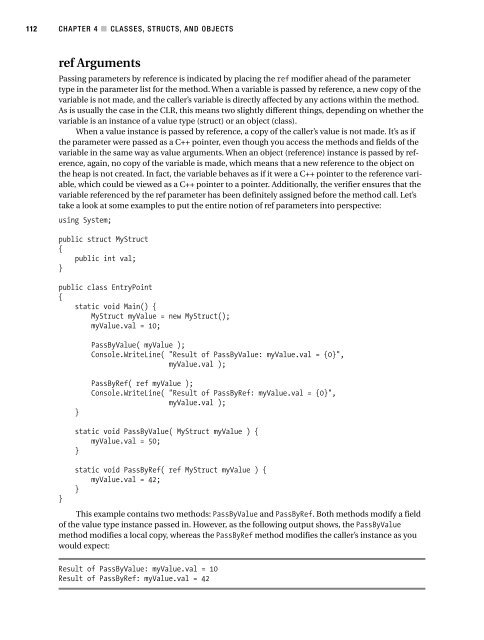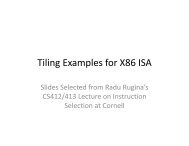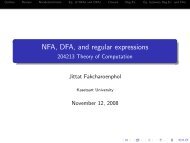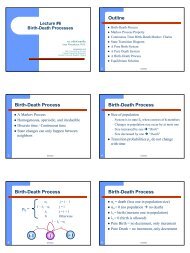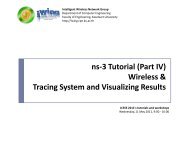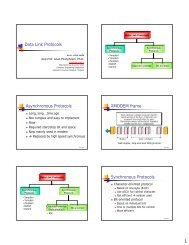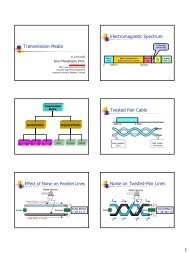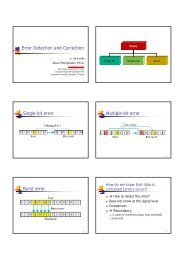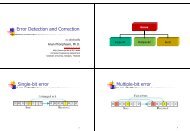- Page 1:
The EXPERT’s VOIce ® in .NETFor
- Page 4 and 5:
Accelerated C# 2008Copyright © 200
- Page 7:
Contents at a GlanceForeword. . . .
- Page 10 and 11:
viii■CONTENTSTypes and Variables
- Page 12 and 13:
x■CONTENTSImplementing Interfaces
- Page 14:
xii■CONTENTSIEnumerable , IEnumer
- Page 17:
■CONTENTSxvC# Query Keywords. . .
- Page 21:
About the Author■TREY NASH curren
- Page 25:
AcknowledgmentsWriting a book is a
- Page 28 and 29:
xxvi■INTRODUCTIONAbout This BookI
- Page 30 and 31:
xxviii■INTRODUCTIONChapter 16,
- Page 32 and 33:
2CHAPTER 1 ■ C# PREVIEW■Note Ac
- Page 34 and 35:
4CHAPTER 1 ■ C# PREVIEW■Note If
- Page 36 and 37:
6CHAPTER 1 ■ C# PREVIEWOverview o
- Page 39 and 40:
CHAPTER 2C# and the CLRA s mentione
- Page 41 and 42:
CHAPTER 2 ■ C# AND THE CLR 11The
- Page 43 and 44:
CHAPTER 2 ■ C# AND THE CLR 13asse
- Page 45:
CHAPTER 2 ■ C# AND THE CLR 15Meta
- Page 48 and 49:
18CHAPTER 3 ■ C# SYNTAX OVERVIEWe
- Page 50 and 51:
20CHAPTER 3 ■ C# SYNTAX OVERVIEWv
- Page 52 and 53:
22CHAPTER 3 ■ C# SYNTAX OVERVIEW{
- Page 54 and 55:
24CHAPTER 3 ■ C# SYNTAX OVERVIEWH
- Page 56 and 57:
26CHAPTER 3 ■ C# SYNTAX OVERVIEWT
- Page 58 and 59:
28CHAPTER 3 ■ C# SYNTAX OVERVIEWO
- Page 60 and 61:
30CHAPTER 3 ■ C# SYNTAX OVERVIEWA
- Page 62 and 63:
32CHAPTER 3 ■ C# SYNTAX OVERVIEWI
- Page 64 and 65:
34CHAPTER 3 ■ C# SYNTAX OVERVIEWU
- Page 66 and 67:
36CHAPTER 3 ■ C# SYNTAX OVERVIEWN
- Page 69 and 70:
CHAPTER 4Classes, Structs, and Obje
- Page 71 and 72:
CHAPTER 4 ■ CLASSES, STRUCTS, AND
- Page 73 and 74:
CHAPTER 4 ■ CLASSES, STRUCTS, AND
- Page 75 and 76:
CHAPTER 4 ■ CLASSES, STRUCTS, AND
- Page 77 and 78:
CHAPTER 4 ■ CLASSES, STRUCTS, AND
- Page 79 and 80:
CHAPTER 4 ■ CLASSES, STRUCTS, AND
- Page 81 and 82:
CHAPTER 4 ■ CLASSES, STRUCTS, AND
- Page 83 and 84:
CHAPTER 4 ■ CLASSES, STRUCTS, AND
- Page 85 and 86:
CHAPTER 4 ■ CLASSES, STRUCTS, AND
- Page 87 and 88:
CHAPTER 4 ■ CLASSES, STRUCTS, AND
- Page 89 and 90:
CHAPTER 4 ■ CLASSES, STRUCTS, AND
- Page 91 and 92: CHAPTER 4 ■ CLASSES, STRUCTS, AND
- Page 93 and 94: CHAPTER 4 ■ CLASSES, STRUCTS, AND
- Page 95 and 96: CHAPTER 4 ■ CLASSES, STRUCTS, AND
- Page 97 and 98: CHAPTER 4 ■ CLASSES, STRUCTS, AND
- Page 99 and 100: CHAPTER 4 ■ CLASSES, STRUCTS, AND
- Page 101 and 102: CHAPTER 4 ■ CLASSES, STRUCTS, AND
- Page 103 and 104: CHAPTER 4 ■ CLASSES, STRUCTS, AND
- Page 105 and 106: CHAPTER 4 ■ CLASSES, STRUCTS, AND
- Page 107 and 108: CHAPTER 4 ■ CLASSES, STRUCTS, AND
- Page 109 and 110: CHAPTER 4 ■ CLASSES, STRUCTS, AND
- Page 111 and 112: CHAPTER 4 ■ CLASSES, STRUCTS, AND
- Page 113 and 114: CHAPTER 4 ■ CLASSES, STRUCTS, AND
- Page 115 and 116: CHAPTER 4 ■ CLASSES, STRUCTS, AND
- Page 117 and 118: CHAPTER 4 ■ CLASSES, STRUCTS, AND
- Page 119 and 120: CHAPTER 4 ■ CLASSES, STRUCTS, AND
- Page 121 and 122: CHAPTER 4 ■ CLASSES, STRUCTS, AND
- Page 123 and 124: CHAPTER 4 ■ CLASSES, STRUCTS, AND
- Page 125 and 126: CHAPTER 4 ■ CLASSES, STRUCTS, AND
- Page 127 and 128: CHAPTER 4 ■ CLASSES, STRUCTS, AND
- Page 129 and 130: CHAPTER 4 ■ CLASSES, STRUCTS, AND
- Page 131 and 132: CHAPTER 4 ■ CLASSES, STRUCTS, AND
- Page 133 and 134: CHAPTER 4 ■ CLASSES, STRUCTS, AND
- Page 135 and 136: CHAPTER 4 ■ CLASSES, STRUCTS, AND
- Page 137 and 138: CHAPTER 4 ■ CLASSES, STRUCTS, AND
- Page 139 and 140: CHAPTER 4 ■ CLASSES, STRUCTS, AND
- Page 141: CHAPTER 4 ■ CLASSES, STRUCTS, AND
- Page 145 and 146: CHAPTER 4 ■ CLASSES, STRUCTS, AND
- Page 147 and 148: CHAPTER 4 ■ CLASSES, STRUCTS, AND
- Page 149 and 150: CHAPTER 4 ■ CLASSES, STRUCTS, AND
- Page 151 and 152: CHAPTER 4 ■ CLASSES, STRUCTS, AND
- Page 153 and 154: CHAPTER 5Interfaces and ContractsDu
- Page 155 and 156: CHAPTER 5 ■ INTERFACES AND CONTRA
- Page 157 and 158: CHAPTER 5 ■ INTERFACES AND CONTRA
- Page 159 and 160: CHAPTER 5 ■ INTERFACES AND CONTRA
- Page 161 and 162: CHAPTER 5 ■ INTERFACES AND CONTRA
- Page 163 and 164: CHAPTER 5 ■ INTERFACES AND CONTRA
- Page 165 and 166: CHAPTER 5 ■ INTERFACES AND CONTRA
- Page 167 and 168: CHAPTER 5 ■ INTERFACES AND CONTRA
- Page 169 and 170: CHAPTER 5 ■ INTERFACES AND CONTRA
- Page 171 and 172: CHAPTER 5 ■ INTERFACES AND CONTRA
- Page 173 and 174: CHAPTER 5 ■ INTERFACES AND CONTRA
- Page 175 and 176: CHAPTER 5 ■ INTERFACES AND CONTRA
- Page 177 and 178: CHAPTER 5 ■ INTERFACES AND CONTRA
- Page 179 and 180: CHAPTER 6Overloading OperatorsC# ad
- Page 181 and 182: CHAPTER 6 ■ OVERLOADING OPERATORS
- Page 183 and 184: CHAPTER 6 ■ OVERLOADING OPERATORS
- Page 185 and 186: CHAPTER 6 ■ OVERLOADING OPERATORS
- Page 187 and 188: CHAPTER 6 ■ OVERLOADING OPERATORS
- Page 189 and 190: CHAPTER 6 ■ OVERLOADING OPERATORS
- Page 191: CHAPTER 6 ■ OVERLOADING OPERATORS
- Page 194 and 195:
164CHAPTER 7 ■ EXCEPTION HANDLING
- Page 196 and 197:
166CHAPTER 7 ■ EXCEPTION HANDLING
- Page 198 and 199:
168CHAPTER 7 ■ EXCEPTION HANDLING
- Page 200 and 201:
170CHAPTER 7 ■ EXCEPTION HANDLING
- Page 202 and 203:
172CHAPTER 7 ■ EXCEPTION HANDLING
- Page 204 and 205:
174CHAPTER 7 ■ EXCEPTION HANDLING
- Page 206 and 207:
176CHAPTER 7 ■ EXCEPTION HANDLING
- Page 208 and 209:
178CHAPTER 7 ■ EXCEPTION HANDLING
- Page 210 and 211:
180CHAPTER 7 ■ EXCEPTION HANDLING
- Page 212 and 213:
182CHAPTER 7 ■ EXCEPTION HANDLING
- Page 214 and 215:
184CHAPTER 7 ■ EXCEPTION HANDLING
- Page 216 and 217:
186CHAPTER 7 ■ EXCEPTION HANDLING
- Page 218 and 219:
188CHAPTER 7 ■ EXCEPTION HANDLING
- Page 220 and 221:
190CHAPTER 7 ■ EXCEPTION HANDLING
- Page 222 and 223:
192CHAPTER 7 ■ EXCEPTION HANDLING
- Page 225 and 226:
CHAPTER 8Working with StringsWithin
- Page 227 and 228:
CHAPTER 8 ■ WORKING WITH STRINGS
- Page 229 and 230:
CHAPTER 8 ■ WORKING WITH STRINGS
- Page 231 and 232:
CHAPTER 8 ■ WORKING WITH STRINGS
- Page 233 and 234:
CHAPTER 8 ■ WORKING WITH STRINGS
- Page 235 and 236:
CHAPTER 8 ■ WORKING WITH STRINGS
- Page 237 and 238:
CHAPTER 8 ■ WORKING WITH STRINGS
- Page 239 and 240:
CHAPTER 8 ■ WORKING WITH STRINGS
- Page 241 and 242:
CHAPTER 8 ■ WORKING WITH STRINGS
- Page 243 and 244:
CHAPTER 8 ■ WORKING WITH STRINGS
- Page 245 and 246:
CHAPTER 8 ■ WORKING WITH STRINGS
- Page 247 and 248:
CHAPTER 8 ■ WORKING WITH STRINGS
- Page 249 and 250:
CHAPTER 8 ■ WORKING WITH STRINGS
- Page 251 and 252:
CHAPTER 9Arrays, Collection Types,
- Page 253 and 254:
CHAPTER 9 ■ ARRAYS, COLLECTION TY
- Page 255 and 256:
CHAPTER 9 ■ ARRAYS, COLLECTION TY
- Page 257 and 258:
CHAPTER 9 ■ ARRAYS, COLLECTION TY
- Page 259 and 260:
CHAPTER 9 ■ ARRAYS, COLLECTION TY
- Page 261 and 262:
CHAPTER 9 ■ ARRAYS, COLLECTION TY
- Page 263 and 264:
CHAPTER 9 ■ ARRAYS, COLLECTION TY
- Page 265 and 266:
CHAPTER 9 ■ ARRAYS, COLLECTION TY
- Page 267 and 268:
CHAPTER 9 ■ ARRAYS, COLLECTION TY
- Page 269 and 270:
CHAPTER 9 ■ ARRAYS, COLLECTION TY
- Page 271 and 272:
CHAPTER 9 ■ ARRAYS, COLLECTION TY
- Page 273 and 274:
CHAPTER 9 ■ ARRAYS, COLLECTION TY
- Page 275 and 276:
CHAPTER 9 ■ ARRAYS, COLLECTION TY
- Page 277 and 278:
CHAPTER 9 ■ ARRAYS, COLLECTION TY
- Page 279 and 280:
CHAPTER 9 ■ ARRAYS, COLLECTION TY
- Page 281 and 282:
CHAPTER 9 ■ ARRAYS, COLLECTION TY
- Page 283 and 284:
CHAPTER 10Delegates, Anonymous Func
- Page 285 and 286:
CHAPTER 10 ■ DELEGATES, ANONYMOUS
- Page 287 and 288:
CHAPTER 10 ■ DELEGATES, ANONYMOUS
- Page 289 and 290:
CHAPTER 10 ■ DELEGATES, ANONYMOUS
- Page 291 and 292:
CHAPTER 10 ■ DELEGATES, ANONYMOUS
- Page 293 and 294:
CHAPTER 10 ■ DELEGATES, ANONYMOUS
- Page 295 and 296:
CHAPTER 10 ■ DELEGATES, ANONYMOUS
- Page 297 and 298:
CHAPTER 10 ■ DELEGATES, ANONYMOUS
- Page 299 and 300:
CHAPTER 10 ■ DELEGATES, ANONYMOUS
- Page 301 and 302:
CHAPTER 10 ■ DELEGATES, ANONYMOUS
- Page 303 and 304:
CHAPTER 10 ■ DELEGATES, ANONYMOUS
- Page 305 and 306:
CHAPTER 10 ■ DELEGATES, ANONYMOUS
- Page 307 and 308:
CHAPTER 10 ■ DELEGATES, ANONYMOUS
- Page 309 and 310:
CHAPTER 11GenericsSupport for gener
- Page 311 and 312:
CHAPTER 11 ■ GENERICS 281Efficien
- Page 313 and 314:
CHAPTER 11 ■ GENERICS 283as an op
- Page 315 and 316:
CHAPTER 11 ■ GENERICS 285MyNested
- Page 317 and 318:
CHAPTER 11 ■ GENERICS 287MyContai
- Page 319 and 320:
CHAPTER 11 ■ GENERICS 289}lContai
- Page 321 and 322:
CHAPTER 11 ■ GENERICS 291public v
- Page 323 and 324:
CHAPTER 11 ■ GENERICS 293Pay atte
- Page 325 and 326:
CHAPTER 11 ■ GENERICS 295■Tip P
- Page 327 and 328:
CHAPTER 11 ■ GENERICS 297programm
- Page 329 and 330:
CHAPTER 11 ■ GENERICS 299}}double
- Page 331 and 332:
CHAPTER 11 ■ GENERICS 301This loo
- Page 333 and 334:
CHAPTER 11 ■ GENERICS 303object t
- Page 335 and 336:
CHAPTER 11 ■ GENERICS 305public I
- Page 337 and 338:
CHAPTER 11 ■ GENERICS 307}}Consol
- Page 339 and 340:
CHAPTER 11 ■ GENERICS 309■Note
- Page 341 and 342:
CHAPTER 11 ■ GENERICS 311}this.mu
- Page 343 and 344:
CHAPTER 11 ■ GENERICS 313}this.co
- Page 345 and 346:
CHAPTER 11 ■ GENERICS 315IList do
- Page 347 and 348:
CHAPTER 12Threading in C#The mere m
- Page 349 and 350:
CHAPTER 12 ■ THREADING IN C# 319T
- Page 351 and 352:
Figure 12-1. State diagram of manag
- Page 353 and 354:
CHAPTER 12 ■ THREADING IN C# 323F
- Page 355 and 356:
CHAPTER 12 ■ THREADING IN C# 325t
- Page 357 and 358:
CHAPTER 12 ■ THREADING IN C# 327b
- Page 359 and 360:
CHAPTER 12 ■ THREADING IN C# 329s
- Page 361 and 362:
CHAPTER 12 ■ THREADING IN C# 331I
- Page 363 and 364:
CHAPTER 12 ■ THREADING IN C# 333}
- Page 365 and 366:
CHAPTER 12 ■ THREADING IN C# 335t
- Page 367 and 368:
CHAPTER 12 ■ THREADING IN C# 337K
- Page 369 and 370:
CHAPTER 12 ■ THREADING IN C# 339T
- Page 371 and 372:
CHAPTER 12 ■ THREADING IN C# 341u
- Page 373 and 374:
CHAPTER 12 ■ THREADING IN C# 343}
- Page 375 and 376:
CHAPTER 12 ■ THREADING IN C# 345a
- Page 377 and 378:
CHAPTER 12 ■ THREADING IN C# 347A
- Page 379 and 380:
CHAPTER 12 ■ THREADING IN C# 349T
- Page 381 and 382:
CHAPTER 12 ■ THREADING IN C# 351t
- Page 383 and 384:
CHAPTER 12 ■ THREADING IN C# 353
- Page 385 and 386:
CHAPTER 12 ■ THREADING IN C# 355/
- Page 387 and 388:
CHAPTER 12 ■ THREADING IN C# 357}
- Page 389 and 390:
CHAPTER 12 ■ THREADING IN C# 359u
- Page 391 and 392:
CHAPTER 12 ■ THREADING IN C# 361l
- Page 393 and 394:
CHAPTER 13In Search of C# Canonical
- Page 395 and 396:
CHAPTER 13 ■ IN SEARCH OF C# CANO
- Page 397 and 398:
CHAPTER 13 ■ IN SEARCH OF C# CANO
- Page 399 and 400:
CHAPTER 13 ■ IN SEARCH OF C# CANO
- Page 401 and 402:
CHAPTER 13 ■ IN SEARCH OF C# CANO
- Page 403 and 404:
CHAPTER 13 ■ IN SEARCH OF C# CANO
- Page 405 and 406:
CHAPTER 13 ■ IN SEARCH OF C# CANO
- Page 407 and 408:
CHAPTER 13 ■ IN SEARCH OF C# CANO
- Page 409 and 410:
CHAPTER 13 ■ IN SEARCH OF C# CANO
- Page 411 and 412:
CHAPTER 13 ■ IN SEARCH OF C# CANO
- Page 413 and 414:
CHAPTER 13 ■ IN SEARCH OF C# CANO
- Page 415 and 416:
CHAPTER 13 ■ IN SEARCH OF C# CANO
- Page 417 and 418:
CHAPTER 13 ■ IN SEARCH OF C# CANO
- Page 419 and 420:
CHAPTER 13 ■ IN SEARCH OF C# CANO
- Page 421 and 422:
CHAPTER 13 ■ IN SEARCH OF C# CANO
- Page 423 and 424:
CHAPTER 13 ■ IN SEARCH OF C# CANO
- Page 425 and 426:
CHAPTER 13 ■ IN SEARCH OF C# CANO
- Page 427 and 428:
CHAPTER 13 ■ IN SEARCH OF C# CANO
- Page 429 and 430:
CHAPTER 13 ■ IN SEARCH OF C# CANO
- Page 431 and 432:
CHAPTER 13 ■ IN SEARCH OF C# CANO
- Page 433 and 434:
CHAPTER 13 ■ IN SEARCH OF C# CANO
- Page 435 and 436:
CHAPTER 13 ■ IN SEARCH OF C# CANO
- Page 437 and 438:
CHAPTER 13 ■ IN SEARCH OF C# CANO
- Page 439 and 440:
CHAPTER 13 ■ IN SEARCH OF C# CANO
- Page 441 and 442:
CHAPTER 13 ■ IN SEARCH OF C# CANO
- Page 443 and 444:
CHAPTER 13 ■ IN SEARCH OF C# CANO
- Page 445 and 446:
CHAPTER 13 ■ IN SEARCH OF C# CANO
- Page 447 and 448:
CHAPTER 14Extension MethodsUsing ex
- Page 449 and 450:
CHAPTER 14 ■ EXTENSION METHODS 41
- Page 451 and 452:
CHAPTER 14 ■ EXTENSION METHODS 42
- Page 453 and 454:
CHAPTER 14 ■ EXTENSION METHODS 42
- Page 455 and 456:
CHAPTER 14 ■ EXTENSION METHODS 42
- Page 457 and 458:
CHAPTER 14 ■ EXTENSION METHODS 42
- Page 459 and 460:
CHAPTER 14 ■ EXTENSION METHODS 42
- Page 461 and 462:
CHAPTER 14 ■ EXTENSION METHODS 43
- Page 463 and 464:
CHAPTER 14 ■ EXTENSION METHODS 43
- Page 465 and 466:
CHAPTER 14 ■ EXTENSION METHODS 43
- Page 467 and 468:
CHAPTER 14 ■ EXTENSION METHODS 43
- Page 469 and 470:
CHAPTER 14 ■ EXTENSION METHODS 43
- Page 471:
CHAPTER 14 ■ EXTENSION METHODS 44
- Page 474 and 475:
444CHAPTER 15 ■ LAMBDA EXPRESSION
- Page 476 and 477:
446CHAPTER 15 ■ LAMBDA EXPRESSION
- Page 478 and 479:
448CHAPTER 15 ■ LAMBDA EXPRESSION
- Page 480 and 481:
450CHAPTER 15 ■ LAMBDA EXPRESSION
- Page 482 and 483:
452CHAPTER 15 ■ LAMBDA EXPRESSION
- Page 484 and 485:
454CHAPTER 15 ■ LAMBDA EXPRESSION
- Page 486 and 487:
456CHAPTER 15 ■ LAMBDA EXPRESSION
- Page 488 and 489:
458CHAPTER 15 ■ LAMBDA EXPRESSION
- Page 490 and 491:
460CHAPTER 15 ■ LAMBDA EXPRESSION
- Page 492 and 493:
462CHAPTER 15 ■ LAMBDA EXPRESSION
- Page 494 and 495:
464CHAPTER 15 ■ LAMBDA EXPRESSION
- Page 496 and 497:
466CHAPTER 16 ■ LINQ: LANGUAGE IN
- Page 498 and 499:
468CHAPTER 16 ■ LINQ: LANGUAGE IN
- Page 500 and 501:
470CHAPTER 16 ■ LINQ: LANGUAGE IN
- Page 502 and 503:
472CHAPTER 16 ■ LINQ: LANGUAGE IN
- Page 504 and 505:
474CHAPTER 16 ■ LINQ: LANGUAGE IN
- Page 506 and 507:
476CHAPTER 16 ■ LINQ: LANGUAGE IN
- Page 508 and 509:
478CHAPTER 16 ■ LINQ: LANGUAGE IN
- Page 510 and 511:
480CHAPTER 16 ■ LINQ: LANGUAGE IN
- Page 512 and 513:
482CHAPTER 16 ■ LINQ: LANGUAGE IN
- Page 514 and 515:
484CHAPTER 16 ■ LINQ: LANGUAGE IN
- Page 516 and 517:
486CHAPTER 16 ■ LINQ: LANGUAGE IN
- Page 518 and 519:
488CHAPTER 16 ■ LINQ: LANGUAGE IN
- Page 520 and 521:
490CHAPTER 16 ■ LINQ: LANGUAGE IN
- Page 522 and 523:
492CHAPTER 16 ■ LINQ: LANGUAGE IN
- Page 524 and 525:
494CHAPTER 16 ■ LINQ: LANGUAGE IN
- Page 526 and 527:
496APPENDIX ■ REFERENCESMeyers, S
- Page 528 and 529:
498■INDEXATL (Active Template Lib
- Page 530 and 531:
500■INDEXdelegatesanonymous metho
- Page 532 and 533:
502■INDEXGang of Four, 123, 366,
- Page 534 and 535:
504■INDEX■LLaMacchia, Brian A.,
- Page 536 and 537:
506■INDEXoperator overloadingaddi
- Page 538 and 539:
508■INDEXStrategy pattern, 266, 2
- Page 540:
510■INDEXvectors, arrays compared


